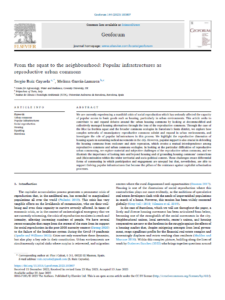Geoforum
Authored by #UnequalCities Network member Melissa García-Lamarca and Sergio Ruiz Cayuela
Abstract: We are currently experiencing a manifold crisis of social reproduction which has seriously affected the capacity of popular access to basic goods such as housing, particularly in urban environments. This article seeks to contribute to and expand debates around the urban housing commons by looking at decommodified and collectively managed housing alternatives through the lens of the reproductive commons. Through the case of the Bloc La Bordeta squat and the broader commons ecologies in Barcelona’s Sants district, we explore how complex networks of emancipatory reproductive commons subsist and expand in urban environments, and investigate the role of popular infrastructures in this process. We highlight the reproductive dimension of housing squats in sustaining radical movements in the city. However, popular support is also crucial in defending the housing commons from enclosure and state repression, which creates a mutual interdependence among reproductive commons and urban commons ecologies. In looking at the particular difficulties of reproductive urban commoning, we explore material and subjective challenges of the reproductive urban commons, and we illustrate the importance of looking into and beyond housing and of grounding housing commons’ connections and (dis)continuities within the wider territorial and socio-political context. These challenges create differential forms of commoning in which participation and engagement are unequal but that, nevertheless, are able to support thriving popular infrastructures that become the pillars of the resistance against capitalist urbanisation processes.
Download >> From the Squat to the Neighbourhood: Popular Infrastructures As Reproductive Urban Commons


